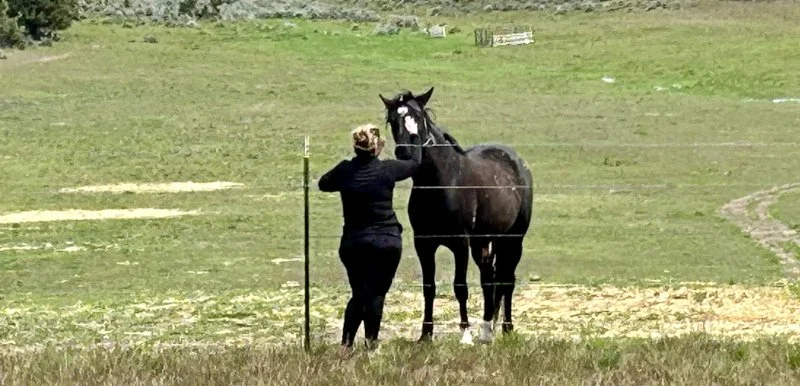Blissful Beings while Healing With Horses
Blissful Beings while Healing With Horses was held last month and sold out to a crowd of 12 participants. Everyone got to participate in a variety of holistic wellness activities. The morning started off with a calming yoga session. Throughout the day, our Blissful Heart practitioners led the group in energy healing, massage, energy balancing and mediumship. It was a delight to nourish our bodies with organic juices and organic meals! To end the day, we all shared our beautiful experiences with each other.
Our retreat group
Wondering how horses can be healing?
Each of our participants were able to spend time with the horses that they were drawn to.
Horses can be healing in various ways through therapeutic activities, often referred to as equine-assisted therapy (EAT) or hippotherapy.
Here's how horses contribute to healing:
Psychological Benefits
Reduced Anxiety and Stress: Interacting with horses can have a calming effect, reducing levels of anxiety and stress. The rhythmic motion of riding can be particularly soothing.
Enhanced Self-Esteem and Confidence: Successfully working with and riding horses can boost self-esteem and confidence. Accomplishing tasks with the horse fosters a sense of achievement.
Emotional Regulation: Horses are sensitive and can mirror human emotions, helping individuals learn to regulate their emotions and develop better coping strategies.
Increased Social Skills: Working with horses often requires teamwork and communication, which can improve social skills and foster positive interactions with others.
A retreat member is drawn to one our rescue horses
Social Benefits
Building Trust and Relationships: Forming a bond with a horse can help individuals develop trust and improve their ability to form relationships with others.
Increased Empathy and Compassion: Caring for and understanding the needs of a horse can foster empathy and compassion, as individuals learn to interpret and respond to the horse's behavior and needs.
Enhanced Communication Skills: Interacting with horses and therapists can improve verbal and non-verbal communication skills, especially for individuals with social or communication disorders.
Improved Balance and Coordination: Riding a horse requires the rider to constantly adjust their posture and maintain balance, which strengthens core muscles and enhances overall coordination.
Better Motor Skills: Activities such as grooming, saddling, and leading a horse help improve fine and gross motor skills.
Trunk Stability: Riding helps improve trunk control and stability, which is beneficial for individuals with conditions like cerebral palsy.
Specific Conditions
Autism Spectrum Disorder (ASD): Equine-assisted therapy has been shown to improve social skills, communication, and sensory processing in children with ASD.
Post-Traumatic Stress Disorder (PTSD): Veterans and trauma survivors often benefit from the calming presence of horses, which can reduce symptoms of PTSD such as anxiety, depression, and hypervigilance.
Physical Disabilities: Individuals with physical disabilities may experience improved mobility, strength, and independence through therapeutic riding.
Mechanisms of Healing
Mirroring and Feedback: Horses provide immediate feedback through their behavior, which can help individuals become more aware of their emotions and behaviors and make positive changes.
Non-Judgmental Companionship: Horses offer a non-judgmental and accepting presence, which can be especially healing for those who have experienced trauma or rejection.
Natural Rhythm and Movement: The gait of a horse mimics the human walk, providing rhythmic movement that can help retrain the brain and body to work together more effectively.
When’s the Next Bend Horse Retreat?
Stay tuned to our social media for an announcement for the next Healing with Horses Retreat!
Thank you retreat participants!
Sources:
sidelinesmagazine.com
suzannewallach.com
openai.com



